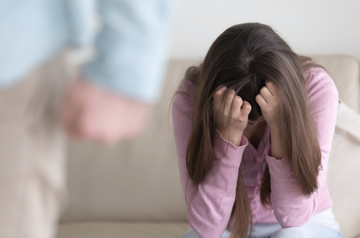"He Always Puts Me Down - Am I In An Abusive Relationship?"
“He’d text me all the time. Initially, it felt good, felt like being wanted. But soon it all came crashing down. Constant patrolling over my whereabouts gave me anxiety issues. Eventually, I preferred staying home with him. That way, I’d not have to deal with the calls and texts.”
This is a real-life experience shared by a SHEROES community member and her story echoes the behavioural patterns in some relationships around us. What many women don’t realise is that they aren’t healthy and are, in fact, examples of emotional abuse. Another member shares her story -
“He’d put me down in front of our friends, make fun of my achievements and then apologize later. He’d do cute things like bringing flowers for me, to make me forget everything. The problem, however, is that he didn’t want anyone else to love me. He would even get envious of my relationship with my parents!”
Emotional abuse is defined as "any act including confinement, isolation, verbal assault, humiliation, intimidation, infantilization or any other treatment which may diminish the sense of identity, dignity, and self-worth." When continuously subjected to such behavior, it can result in mental and physical disorders too.
Healing out of an emotionally abusive relationship is the second step to recovery, the first being what to do while you are still living with your abuser?
Here are some steps in the right direction.
1. Recognise Patterns
Abusers often display patterns of control, humiliation and isolation. They may limit your freedom, be constantly keeping tabs on your meetings and whereabouts, or reject you and ridicule you by putting you down, fueling your insecurities etc. This pattern of a controlling behaviour can spread to monitoring your finances, to accessing your phone/social media accounts.
This pattern in a relationship starts when one partner emotionally abuses the other, typically to show dominance. The abusive partner may show regret for his actions and might make up by being extra charming, apologetic and giving.
2. Identify Erratic Behaviour
A SHEROES community member shares, "He'd taunt me, apart from asking aggressive questions, until there was some kind of glitch in my story or my point. I would tell him that I am trying to tell the truth. But he would call me a liar and that if I would just stop lying, we could be happy. At times I’d just give up and give him a version that he wanted to hear.”
3. Nourish Yourself
Having to deal with emotional abuse takes a toll on the overall health of the victim. It’s important to take care of your body and try to find mechanisms that help, in terms of dealing with the stress of an emotionally abusive relationship.
Nourishing one’s body with healthy food and enough rest, helps in the long term. It’s very important to start taking charge of one’s sanity by engaging in activities that one enjoys. Sometimes starting a new exercise routine, reading a book, practicing meditation helps in relieving stress. Remember, your mind and soul need as much nourishing as you can possibly give it.
4. A Strong Support System
Maintain and develop your relationships with friends and family, as closely you can. Your intimate partner might try to limit your interaction with your closed ones, let them know what’s going on in your life. You need as much support and care as you can get from people who can uplift and nurture you.
5. Set Boundaries
You need to set some initial boundaries with your partner. Do not engage or react aggressively to any of their behaviours. Psychologist Marie Hartwell-Walker's article "Signs You Are Verbally Abused: Part II,” suggests calmly letting him know that you are sorry he feels that way, but that you expect him to treat you with respect.
If your partner still doesn’t understand, simply walk away from the situation - do not interact.
6. Put Your Safety First
The abuse might likely escalate with time and can turn into physical violence. With this in mind, prioritize your safety. You may respond to threats differently if you fear violence, such as avoiding them or not fighting back. While not defending yourself may be difficult or might hurt you, remember that you are prioritizing your safety until you can make you next move.
“The damage and invisible scars of emotional abuse are very difficult to heal, because memories are imprinted on our minds and hearts and it takes time to be restored. Imprints of past traumas do not mean a person cannot change their future beliefs and behaviors. As humans, we do not easily forget. However, as we heal, grieve and let go, we become clear-minded and focused to live restore and emotionally healthy.”
? Dee Brown, Breaking Passive-Aggressive Cycles
If you feel that you are stuck in between these behavioural patterns, word them out. It helps in realising what’s happening with you. Maala Community on SHEROES has created a space that harvests these communications. Let us know how you feel about emotional abuse. Join the conversation here.
















